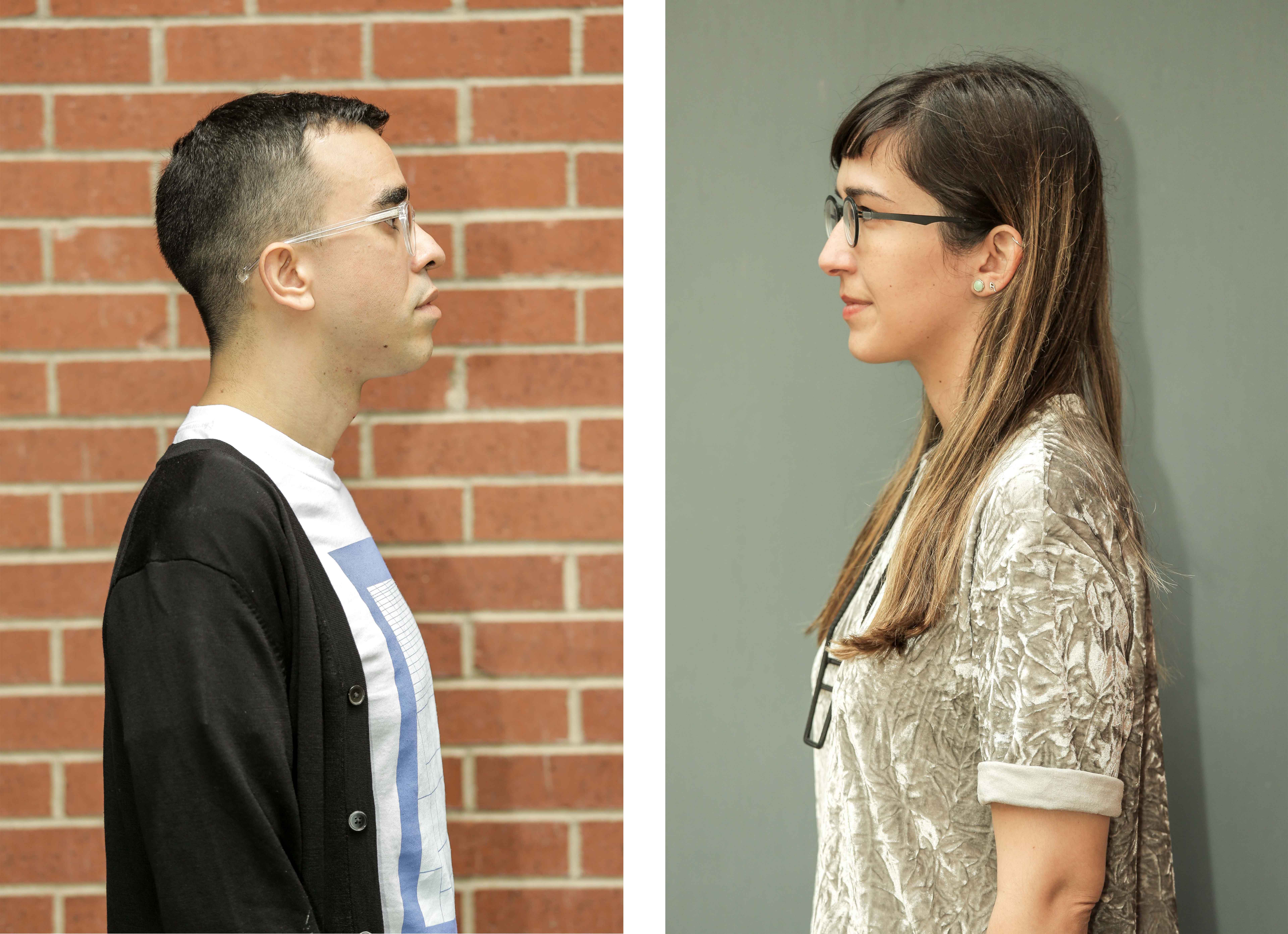Nostalgia for the home you’ve left is a powerful thing. Looking back is like unsealing a Ziplock bag of a former life – sounds, smells, sights. You can unlock these memories anytime, and even choose to carry them with you always. But they’re inherently confined to the period of way-back-then; until you consciously revisit them, those memories are separate from your current life.
For Angélica Negrón and José Olivares, the married couple who founded the Puerto Rican band Balún, however, nostalgia is more than a cache of the past. Just over a decade after joining the diaspora by way of New York City, their memories of the island remain very much alive, having mutated in being accessed while living in a place where every facet of Puerto Rican culture, from its history and influences to newfound contemporary incarnations, converges.
Prisma Tropical, the group’s sophomore album, is a product of new understandings, of discovering more about their roots from afar. Recorded throughout three years and containing material written even before that, it’s a sonic representation of Balún’s collective experience in the Puerto Rican diaspora.
“We kind of naturally fell into trying to explore things that we kind of took for granted or ignored in Puerto Rico,” Olivares says. “The whole idea of tropical rhythms and just more infusing ourselves with our Caribbean selves.”
The album as a prism reflecting the complexities of a culture is a straightforward concept, but that doesn’t make it any less fascinating. Balún blends influences in a way that they can be singled out, picked apart – the prickling, swaying debow riddim of “Años Atrás,” the reggaeton on “La Nueva Ciudad” so slowed it recalls its Jamaican dancehall origins, and ventures back into dembow. In meshing it all with the disparate styles of shoegaze, experimental synth, and classical orchestration, the sound is magically cohesive, and uniquely Balún.
The barril de bomba, the cuatro, and the tiple are present too, but often discreetly so – although on an interlude like on “Coralina,” the cuatro takes an obvious centerstage in a tribute the classic Cuban guaracho “El Flamboyán.” There’s afrobeat in the mix on “Pulsos,” where renowned Brooklyn collective Antibalas adds vibrant, elated horns throughout.
Almost more compelling than the results themselves, however, is what motivates Balún to include those influences in the first place.
“At one point, nearly everyone in the band was living in the same neighborhood, and we had other friends from Puerto Rico who would get together and start watching YouTube videos. We would go to the salsa we grew up with in Puerto Rico, watching all the stuff we would see on Puerto Rican television to kind of feel like we’re back in the island,” Olivares says. “All the reggaeton videos, the underground, old school dembow – I started looking at it in a different way than when I was in Puerto Rico.”

Over the course of Prisma Tropical‘s creation, Olivares taught music production to South Bronx teens who asked how to translate African rhythms electronically. Dembow was a natural fit; Balún has adapted this as dreambow, a self-coined descriptor for a whimsical version of the rhythm, made ethereal by Negrón’s effervescent vocals.
For Negrón, all the salsa gorda (her father’s favorite) and reggaeton growing up made her look to other genres instead. “I think when those things are so close to you and they’re always there and so present, you’re into other music. At least in my case, I wanted to get away from them a little bit, being saturated by them,” she says. Balún’s early days in the San Juan indie scene were spent playing mainly alongside punk bands.
“Once you’re away from it and you come back with fresh ears, I think you can appreciate [those genres] differently and have a different perspective on it, and listen to it for its rhythmic and harmonic or musical kind of interest. I think it was a healthy distance that made me appreciate it more,” she says.
Olivares adds, “Being here in New York, I could see the origins and all the mutations of that dembow riddim. And I immediately realized that, ‘oh, there’s more to that.’”
As often as Prisma Tropical weaves in diaspora culture, however, it also filters in the realities of living that experience – like the literal back-and-forth of traveling between two places, which figured heavily in the creation of “El Espanto.” Like the rest of the tracks, it was recorded in New York with producer Lawson White, who’s collaborated with with Shakira, Santigold, and Kim Gordon, among others. Negrón first met him scoring the 2012 Puerto Rican film Los Condenados, which he produced, mixed, and engineered.
And while a demo version was written in the city, the track was ultimately completed on the island two years ago.

Olivares often tests new material out on his father, who lives on the island, gauging quality by his reaction – he dubbed “El Espanto” a banger. So Balún finished the song there, testing it out the next day at a local festival. Its explosive IDM finale is likely a result of having finalized the track with the intention of immediately performing it live.
“It’s been really heartbreaking to be here and see the way things are developing on the island.”
Negrón’s memories came into play, too. Writing the lyrics, the song’s disjointed feeling – a result of salsa inspirations syncopated – got her wondering: If you had the opportunity to do something to a difficult, frustrating person, what would you do? That brought Negrón some 15 years back to when she performed in an orchestra and played one-off shows with a fellow violinist.
“One of our gigs was playing at a santería ceremony, the two of us playing classical music at this altar,” she says. “I had this kind of image of that moment, and the memory of it, as I was writing this song.” Its message is something of a “desperate call to action,” Negrón adds, likening it to the spiritual cleansing of a despojo.
If only a despojo could wipe clean the myriad issues Puerto Ricans face – the problems that often become reasons to leave.
“It’s been really heartbreaking to be here and see the way things are developing on the island,” Reymundi says. Another part of diaspora life, of course, is being separated from those you love. In the crisis that followed Hurricane María, everyone but bassist Noraliz Ruiz was in New York, who returned to the island a few years ago.
Ruiz recorded the instrumental opener, “Vaivén,” shortly after the hurricane; the ubiquitous nighttime chirps of the coquí frog form a rhythm behind her plucking. “She didn’t have any power or any light,” Negrón says. “You can feel the heaviness of the situation just in her playing.”
While they visit the island often, Reymundi, Negrón, and Olivares all plan to return permanently – eventually.
“I struggle with this every day, thinking of when I can come back.”
“I struggle with this every day, thinking of when I can come back,” Negrón says. “But I think because of what I do [as a composer], and the competition in general.” The brilliant mentors who first guided her, she adds, have been limited by the finite opportunities available.
The island’s economic recession was well underway when Negrón and Olivares left, and worsening when Reymundi and Ruiz moved. But, as hindsight reveals, the situation was nowhere near the rock-bottom depths of now. One can surmise that opportunities they came to New York in search of are still as inaccessible in Puerto Rico as they were then, if not even more difficult to come by.
The access gained in New York has wrought major accomplishments for all Balún members: Ruiz earned her PhD in ethnomusicology, Negrón educates young students in a New York Philharmonic program, Olivares helps direct a computer science program of the NYC Department of Education, and Reymundi is working for Kickstarter.
Puerto Ricans living in the diaspora – so many of them who saw no choice but to leave their island, however recent or long ago – may see their own stories and experiences reflected in Prisma Tropical. It offers warm nostalgia, but fills the emptiness that a reminder of home might evoke with an invitation to see those memories through the lens of community and connecting cultures.
“The last song, ‘Reflejo,’ the way that the song is performed, you sort of feel that the song is self-destructing,” Negrón says. “There’s an idea of decay, then that process of introspection – then it’s like a chance to start over again.”
The feeling is future-forward – it’s hopeful.
Balún’s Prisma Tropical is out now on Good Child Music.







